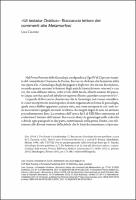Chapter «Ut testatur Ovidius»: Boccaccio lettore dei commenti alle Metamorfosi
| dc.contributor.author | Ciccone, Lisa | |
| dc.date.accessioned | 2022-09-15T20:07:23Z | |
| dc.date.available | 2022-09-15T20:07:23Z | |
| dc.date.issued | 2020 | |
| dc.identifier | ONIX_20220915_9788855182362_88 | |
| dc.identifier.issn | 2704-5919 | |
| dc.identifier.uri | https://library.oapen.org/handle/20.500.12657/58292 | |
| dc.language | Italian | |
| dc.relation.ispartofseries | Studi e saggi | |
| dc.subject.classification | thema EDItEUR::D Biography, Literature and Literary studies | en_US |
| dc.subject.other | Exegesis | |
| dc.subject.other | Ovid | |
| dc.subject.other | Myth | |
| dc.subject.other | Allegory | |
| dc.title | Chapter «Ut testatur Ovidius»: Boccaccio lettore dei commenti alle Metamorfosi | |
| dc.type | chapter | |
| oapen.abstract.otherlanguage | The article investigates the relationship between Boccaccio's Genealogie and the exegesis of Ovid's Metamorphoses. For each character included in his genealogy, Boccaccio reports first of all the contents of the myth related to it and then the different literal and allegorical interpretations. The main sources are, besides Ovid, Paolo da Perugia and a mysterious Theodontius, who can be identified with a commentary on the Metamorphoses produced in the 11th or 12th century. The article aims to demonstrate that Boccaccio follows the method used by medieval exegetes of the Metamorphoses: rejecting the pagan contents of the myth, the commentators offered an allegorical and moralising interpretation, in fact rewriting the Metamorphoses as a 'medieval' work. | |
| oapen.identifier.doi | 10.36253/978-88-5518-236-2.05 | |
| oapen.relation.isPublishedBy | bf65d21a-78e5-4ba2-983a-dbfa90962870 | |
| oapen.relation.isbn | 9788855182362 | |
| oapen.series.number | 219 | |
| oapen.pages | 15 | |
| oapen.place.publication | Florence |

